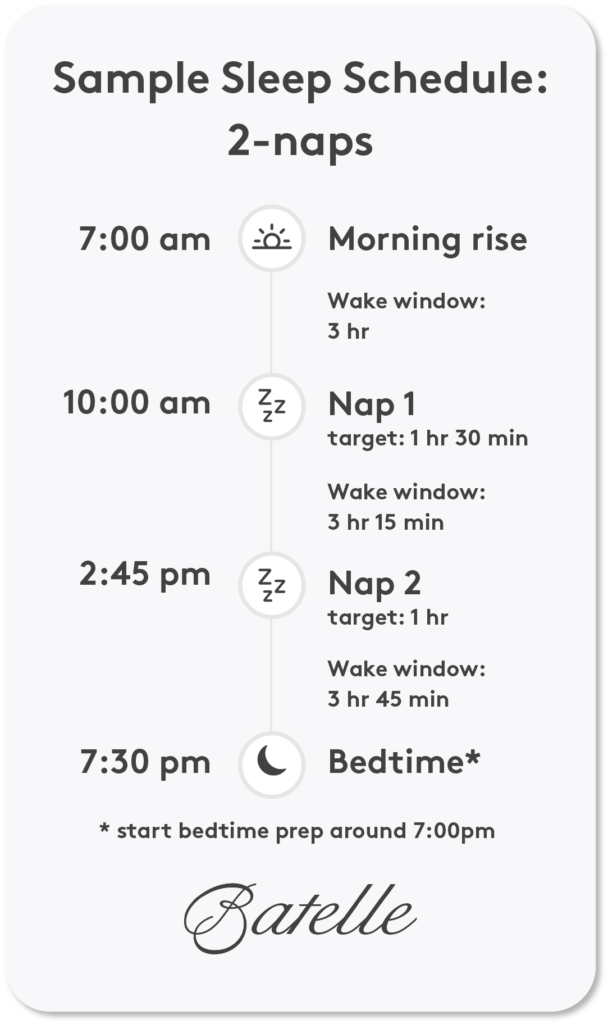
Now that your baby has smoothly transitioned to a 2-nap routine, hopefully, you’re noticing a more predictable pattern in their sleep schedule. That doesn’t necessarily mean that all is well in the sleep department though thanks to the 10-month sleep regression.
In this blog, we’ll explore your 10-month-old’s sleep schedule in detail – taking a deep dive on their sleep needs, wake windows, and how to encourage longer stretches of nighttime sleep.
When it comes to your 10-month-old’s sleep schedule, keep in mind that everyone has different sleep needs. While average sleep needs can be helpful, your baby’s unique requirements may not match them exactly.
The best way to ensure your baby is getting enough sleep is to observe their mood and energy levels. If they are content and alert, they are probably well-rested, even if their sleep pattern is different from the norm. Additionally, if your baby was born prematurely, always take your baby’s adjusted age into account when establishing a sleep routine. This becomes less important after they’re a year old.
The National Sleep Foundation and the American Academy of Sleep Medicine recommend that infants aged 4-11 months should get 12-16 hours of sleep per day, including naps. These recommendations are based on the sleep needs necessary to support the growth and development of infants, as well as the typical sleep patterns observed in this age group. Of the 12-16 hours of sleep per day, the minimum recommended amount of nighttime sleep for infants is around 10 to 12 hours, and the rest is achieved through napping. A well-structured baby sleep schedule is key for your 10-month-old, ensuring they get the total sleep required for healthy development.

Aim for a cumulative daytime sleep total of 2-3 hours. When planning naps for your 10-month-old, keep in mind that little ones can only sleep so much in a 24-hour period, so the distribution of sleep is important—if too much of it happens in the daytime, expect reduced sleep at night.
Customize your little one’s sleep schedule with Batelle’s Schedule Creator. Input your baby’s usual waking time, bedtime, number of naps, and sleep duration, and our generator will tailor a sleep schedule with appropriate wake windows for your baby’s age. Try it out now and make sleep planning a breeze!
In general, your 10-month-old baby needs 3-3.75 hours of awake time between sleep periods. Wake windows are typically shorter at the beginning of the day and elongate as the day progresses, with the longest wake window occurring before bedtime.
If your little one has had a fairly consistent nap schedule, you could consider shifting to a by-the-clock scheduling approach rather than going strictly by wake windows. For example, a typical 10-month-old’s sleep schedule includes a morning nap around 9 am and an afternoon nap around 2 pm. However, it’s still important to target age-appropriate wake windows with this approach to avoid overtiredness.
Starting the day at a consistent time and keeping bedtime as consistent as possible is also important here as the body’s internal clock calibrates to these daily rhythms which contributes to better sleep overall. This is true not only for your baby but also for you.
As a rule of thumb, bedtime will typically occur 12-13 hours after morning wake-up. That means that if your little one woke up at 7:00am, bedtime will be between 7:00-8:00pm. This example illustrates why it’s important not to start the day any earlier than 6:00am as that will result in a bedtime that is too early, or lead to your little one getting too much daytime sleep – both scenarios can perpetuate the cycle of less than optimal nighttime sleep and early rising.
At 10 months old, it is common for babies who have learned to fall asleep independently to sleep for longer stretches at night, with many being able to sleep through the night (10-12 hours) without requiring intervention from their caregiver. It is also common for night waking to still occur at this age. The 10-month sleep regression is a common challenge that may disrupt your baby’s sleep schedule, leading to changes in their night-time and nap routines and affecting their ability to sleep through the night.
Keep in mind that we all wake briefly during the transition between sleep cycles, so no one—regardless of age—truly sleeps through the night. The distinguishing characteristic of infants who sleep for 10-12 hours without requiring their caregiver’s intervention is that they can transition smoothly between sleep cycles without waking.
Transitioning between sleep cycles without requiring intervention is sometimes referred to as ‘self-soothing,’ and it’s not a skill that can be taught in a traditional sense, but rather a natural part of an infant’s development that emerges over time. Our programs are designed to foster your child’s natural evolution of these skills, which contribute to their ability to transition between sleep cycles independently.
The longest stretch of sleep occurs at the start of the night as that’s when melatonin and sleep pressure peak. As the night progresses, sleep pressure is relieved and melatonin production decreases which leads to lighter sleep, and an increased likelihood of wake-ups.
A common story we hear from the families we work with at Batelle is that they feed or rock, or otherwise put their little one to sleep at the start of the night, and they then sleep for anywhere from 2-6 hours before waking up and needing some level of parental involvement to get back to sleep. For some, there is just a single wake-up that is handled efficiently and everyone gets back to sleep, and for others this leads to a very fragmented night as the little one wakes every 1-3 hours for the rest of the night needing support to get back to sleep.
If your baby is fed or rocked to sleep and it’s no longer resulting in restful sleep for your whole family, it’s ok to make a change to the way your little one settles to sleep. Incorporating a consistent bedtime routine, and helping your little one learn to settle to sleep without relying on being fed or rocked can encourage longer, more restful nights for everyone.
The period between 8 and 10 months is a crucial stage in your child’s development. During this time, they will be learning new skills, gaining mobility, and may experience separation anxiety. Additionally, teething can also affect their sleep intermittently from age 4 months to 4 years.
Sleep regression, which is the disruption of normal sleeping patterns due to changes in routine or developmental milestones, can last anywhere from 2 to 6 weeks. The extent and duration of sleep disruption may vary depending on several factors, such as how you respond to your baby during these times. It is typical to provide support to your child’s sleep during intense phases of developmental growth, when they are experiencing teething discomfort, or when they have had a day of short naps and inadequate sleep. However, over-reliance on your interaction to help your child fall back asleep can lead to an unsustainable routine.
If you are feeling overwhelmed or stuck in a pattern that is causing you to feel exhausted, sleep training can be an effective solution. By establishing consistent bedtime routines, nighttime interactions, and sleep habits, you can reduce the intensity and duration of sleep disruption during sleep regression or schedule changes.
The Batelle Sleep Program is a great option to help you achieve better sleep for your whole family. We’ve helped over 5,000 families get the sleep they need, and we’d love to help you too!
